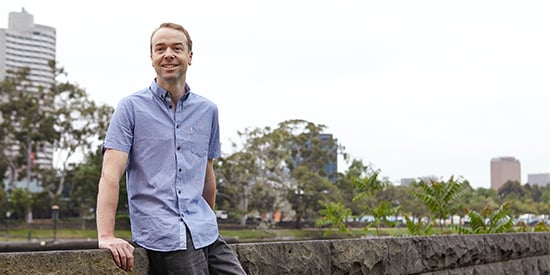$9.8m state-of-the-art research centre to make waves in sustainable aquaculture
Research news
A new Deakin University $9.8m state-of-the-art aquaculture research centre is set to drive sustainable fish production, novel feed and aquaculture technology development, and industry training.
Aquaculture is the fastest growing food production sector globally and is vital to meeting the food demands of future generations.
Associate Professor David Francis from Deakin’s School of Life and Environmental Sciences will lead research working towards improving the sustainability of the aquaculture industry by changing one simple factor; what we feed our farmed fish.
Aquaculture has historically placed a reliance on the use of less palatable, smaller species of fish – such as capelin, anchoveta and menhaden – which are rendered into fish meal and fish oil to produced nutritionally complete feeds. However, fluctuations in the cost and availability of these ingredients have raised concerns over the ability of the industry to grow in an economically viable and sustainable manner.
Enter the AquaFI Lab, Deakin’s forthcoming aquaculture research innovation centre. Thanks to funding from the Victorian Government through its Higher Education State Investment Fund (VHESIF), the new state-of-the-art facility will be based at the Waurn Ponds campus and focus on sustainable fish production, novel feed development and aquaculture technology.
A/Prof Francis said a circular bioeconomy is the future of the aquaculture feed industry. The AquaFI Lab will work directly with industry to explore the use of sustainable ingredients in creating fish food, and how underutilised by-products from other industries can have a second life.
“Our key focus is to improve the way we feed our farmed fish, and to make it more nutritious and sustainable,” A/Prof Francis said.
A/Prof Francis and his team have been taking the discards from the agriculture, poultry and livestock industries, and working on technology to make them more digestible and nutritious as feed ingredients for farmed fish. This way, we can unlock the highly valuable benefits of materials that have up until now been underutilised.
He said the trick is to ensure that the new feed contains all the necessary nutrients required to keep the fish happy and healthy – without changing the flavour of the fish or health benefits of the final product and upsetting the consumer in the process.
To assess this, A/Prof Francis and his team are collaborating with Deakin’s School of Exercise and Nutrition Sciences to ensure the new feed products don’t negatively impact the star of our beloved fish and chips.
Collaborations like this will drive innovation at the AquaFI Lab. Not just a research and development facility, the AquaFI Lab will be a place for cross-disciplinary curiosity and training, with an internship component and room for HDR students across many fields of study.
“Aquaculture covers a range of disciplines, like biology, chemistry, engineering and economics,” A/Prof Francis said. “We want to bring in the entire aquaculture industry and solve these problems together.”
The team are already set to work with biotechnologists and engineers, to innovate how potential fish feed can be processed to further improve nutritional quality and environmental sustainability.
A/Prof Francis said these investigations will help commercial farmers understand how we can mitigate stress in farmed species and are the key to making a tangible difference in the seafood industry.
“We’re looking to make some major strides towards the on-farm management of fish through our novel dietary interventions,” A/Prof Francis said.
More information:
Share this story

Key Fact
Associate Professor David Francis.
